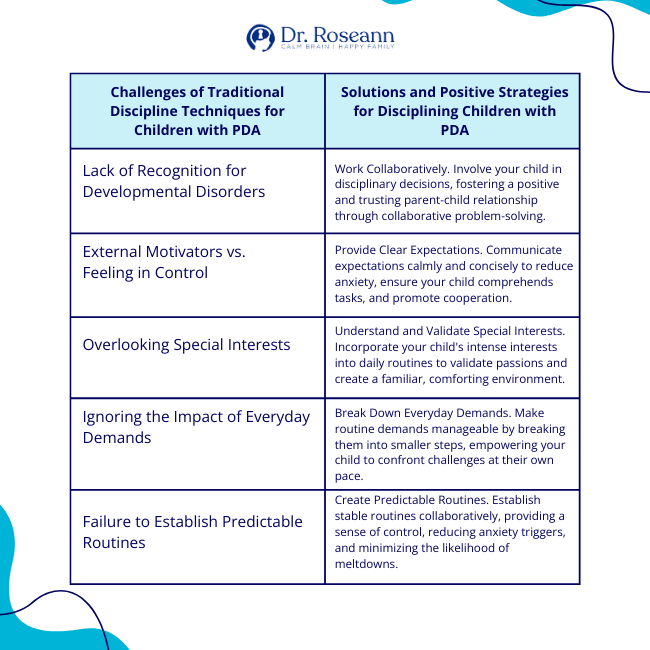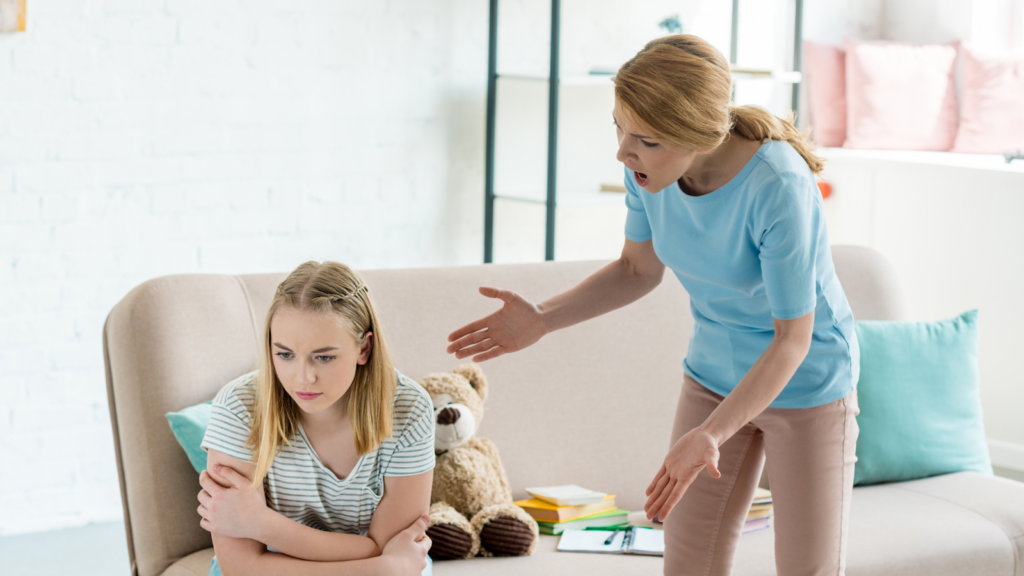Pathological Demand Avoidance (PDA) is a term that falls under the umbrella of autism spectrum disorders. Children with PDA often struggle with an intense need to be in control of their environment, coupled with an aversion to everyday demands or requests. It's crucial to recognize that PDA is not a stand-alone diagnosis but rather a part of the broader autism spectrum (Kildahl et al., 2021).
Disciplining a child with PDA comes with its set of challenges. These children might exhibit behaviors that include extreme anxiety, meltdowns, or avoidance strategies when confronted with demands they perceive as overwhelming (Dundon, 2021).
Why Traditional Discipline Techniques Don’t Work
Traditional discipline techniques that are effective for neurotypical children may not yield the same results for those with PDA. Children with PDA don’t respond well to traditional approaches as they prioritize feeling in control of their environment over external motivations. Here’s a detailed explanation as to why traditional techniques fail to work.
Lack of Recognition for Developmental Disorders
Traditional discipline often operates under the assumption that all children respond uniformly to rewards and punishments. However, the behaviors exhibited by children with PDA are not mere acts of defiance but manifestations of a more profound struggle to navigate their world.
External Motivators vs. Feeling in Control
Children with PDA may prioritize a different currency – the feeling of being in control. In their quest to manage overwhelming demands, these children are less likely to be swayed by external incentives. The key lies in understanding and addressing their intrinsic need for autonomy.
Overlooking Special Interests
In conventional discipline, special interests in children might be perceived as distractions or obstacles. However, PDA flips this perspective. Parents must be more creative in handling what seems to distract or overwhelm their children.
Ignoring the Impact of Everyday Demands
Everyday demands that seem routine to neurotypical children can escalate into monumental challenges for those with PDA. Parents must recognize and address this discrepancy to better support their children.
Failure to Establish Predictable Routines
Traditional discipline may overlook the significance of stability and predictability in the lives of children with PDA. Many of them experience anxiety triggers due to the abrupt changes in their task or schedule.
Positive Strategies for Disciplining Children with PDA
Here are positive strategies for disciplining a child with PDA, which also helps in supporting their brain health, attention, mood, stress, and behavior. Parents are encouraged to add these strategies to their parenting toolkit:
1. Work Collaboratively
Recognize the need for collaboration. Instead of imposing discipline unilaterally, involve your child in the process. Discuss consequences together so the child feels a sense of authority in decision-making. This collaborative approach fosters a positive and trusting parent-child relationship.
2. Provide Clear Expectations
Communication is key when it comes to disciplining a child with PDA. It’s important to provide clear expectations calmly and concisely as ambiguity can lead to anxiety. Ensure your child understands what is expected of them to reduce stress and enhance cooperation.
3. Understand and Validate Special Interests
Children with PDA often have intense, focused interests. Instead of viewing these as distractions, incorporate these special interests into daily routines. By doing so, parents not only validate their child's passions but also provide a sense of familiarity and comfort in their routine.
4. Break Down Everyday Demands
Daily demands that may seem routine to neurotypical children can be overwhelming for those with PDA. Parents should try to break down tasks into smaller, more manageable steps. This not only makes the demands more digestible but also empowers the child to tackle challenges at their own pace.
5. Create Predictable Routines
Stability is crucial for children with PDA. Establishing predictable routines helps these children feel in control. It also reduces anxiety and the likelihood of meltdowns (Cat, 2018). Parents should collaborate with their children in creating routines and allow them to feel a sense of agency in their daily lives.

Disciplining a child with PDA requires a unique blend of empathy, understanding, and a hopeful outlook. The holistic approach encourages parents to view their child's challenges as opportunities for growth and understanding rather than insurmountable obstacles.
The BrainBehaviorResetTM Program can help parents navigate the challenges of raising children with autism and PDA. Recognizing PDA as a developmental disorder within the autism spectrum, the program provides a personalized toolkit that prioritizes positive growth and connection.
The program integrates natural solutions such as neurofeedback, magnesium supplements, and PEMF therapy to help instill hope in parents of children facing the daily challenges and complexities of PDA.
Embracing natural solutions that support brain health and addressing the specific needs of children with PDA allows parents to create an environment that nurtures positive behavior and emotional well-being. It's important to remember that every child is different, and there's no one-size-fits-all solution. But with the right approach, your child can thrive in this world.
Parent Action Steps
☐ Foster empathy by understanding PDA within the autism spectrum.
☐ Incorporate your child's special interests into daily routines.
☐ Establish predictable routines collaboratively to provide stability and reduce anxiety.
☐ Break down everyday demands into manageable steps to empower your child.
☐ Communicate clear expectations to enhance cooperation.
☐ Shift to collaborative discipline and involve your child in these discussions.
☐ Use the Solutions Matcher to get a personalized treatment for your child.
Citations
Cat, S. (2018). PDA by PDAers: From Anxiety to Avoidance and Masking to Meltdowns. Jessica Kingsley Publishers.Dundon, R. (2021).
PDA in the Therapy Room: A Clinician’s Guide to Working with Children with Pathological Demand Avoidance. Jessica Kingsley Publishers.
Kildahl, A. N., Helverschou, S. B., Rysstad, A. L., Wigaard, E., Hellerud, J. M., Ludvigsen, L. B., & Howlin, P. (2021). Pathological demand avoidance in children and adolescents: A systematic review. Autism, 25(8), 136236132110343. https://doi.org/10.1177/13623613211034382
Are you looking for SOLUTIONS for your struggling child or teen?
Dr. Roseann and her team are all about science-backed solutions, so you are in the right place!
Grab your complimentary copy of
147 Therapist-Endorsed Self-Regulation Strategies for Children: A Practical Guide for Parents
You can get her books for parents and professionals, including: It’s Gonna Be OK™: Proven Ways to Improve Your Child’s Mental Health, Teletherapy Toolkit™ and Brain Under Attack: A Resource For Parents and Caregivers of Children With PANS, PANDAS, and Autoimmune Encephalopathy.
If you are a business or organization that needs proactive guidance to support employee mental health or an organization looking for a brand representative, check out Dr. Roseann’s professional speaking page to see how we can work together.
Dr. Roseann is a Children’s Mental Health Expert and Licensed Therapist who has been featured in/on hundreds of media outlets including The Mel Robbins Show, CBS, NBC, PIX11 NYC, Today, FORBES, CNN, The New York Times, The Washington Post, Business Insider, Women’s Day, Healthline, CNET, Parade Magazine and PARENTS. FORBES called her, “A thought leader in children’s mental health.”

She coined the terms, “Re-entry panic syndrome” and “eco-anxiety” and is a frequent contributor to media on mental health.
Dr. Roseann Capanna-Hodge has three decades of experience in working with children, teens and their families with attention-deficit hyperactivity disorder (ADHD), autism, concussion, dyslexia and learning disability, anxiety, Obsessive Compulsive Disorder (OCD), depression and mood disorder, Lyme Disease, and PANS/PANDAS using science-backed natural mental health solutions such as supplements, magnesium, nutrition, QEEG Brain maps, neurofeedback, PEMF, psychotherapy and other non-medication approaches.
She is the author of three bestselling books, It’s Gonna Be OK!: Proven Ways to Improve Your Child's Mental Health, The Teletherapy Toolkit, and Brain Under Attack. Dr. Roseann is known for offering a message of hope through science-endorsed methods that promote a calm brain.
Her trademarked BrainBehaviorResetⓇ Program and It’s Gonna be OK!Ⓡ Podcast has been a cornerstone for thousands of parents facing mental health, behavioral or neurodevelopmental challenges.
She is the founder and director of The Global Institute of Children’s Mental Health, Neurotastic™Brain Formulas and Dr. Roseann Capanna-Hodge, LLC. Dr. Roseann is a Board Certified Neurofeedback (BCN) Practitioner, a Board Member of the Northeast Region Biofeedback Society (NRBS), Certified Integrative Mental Health Professional (CIMHP) and an Amen Clinic Certified Brain Health Coach. She is also a member of The International Lyme Disease and Associated Disease Society (ILADS), The American Psychological Association (APA), Anxiety and Depression Association of America (ADAA) National Association of School Psychologists (NASP), International OCD Foundation (IOCDF).
© Roseann-Capanna-Hodge, LLC 2023










